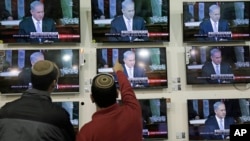Israeli Prime Minister Benjamin Netanyahu's warning to the U.S. Congress that a nuclear deal with Iran would threaten Israeli and world security has elicited a mixed reaction at home.
Many are divided over whether Tuesday's speech in Washington was primarily a campaign maneuver as Israelis prepare for national elections in two weeks.
Addressing a combined session of Congress, Netanyahu said he was motivated only by deep concern over Iran's reported nuclear weapons program and its threat to Israeli security.
Iran says its nuclear program is for peaceful purposes only. And U.S. President Barack Obama said after the speech that the Israeli leader offered no alternative to negotiations to roll back and freeze Iran’s nuclear program.
The prime minister criticized the U.S.-led negotiations with Tehran that reportedly would limit Iran's capacity to build a nuclear weapon in exchange for a gradual lifting of sanctions against Iran.
"This deal has two major concessions: one, leaving Iran with a vast nuclear program; and two, lifting the restrictions on that program in about a decade. That's why this deal is so bad. It doesn't block Iran's path to the bomb. It paves Iran's path to the bomb," the prime minister said.
Appearance brings objections
Netanyahu's appearance was criticized in the United States for being scheduled too close to Israel's elections and without consultations with the Obama administration.
In Israel, it has been criticized as dividing the American public and undermining U.S. support for the Jewish state.
Isaac Herzog is the head of a center-left alliance that is Netanyahu's strongest election challenger. During a campaign rally Tuesday, he said the speech will not stop Iran's nuclear program and will not influence the negotiations.
"As a result, this speech is a most serious sabotage to Israeli-US. relations," Herzog said. He added it would’t change the Obama administration's position and would just widen the split with Israel’s friend and only strategic ally.
Divided views
An expert on U.S.-Israeli relations at Israel's Bar-Ilan University, Eytan Gilboa, said on Israel's Channel One television that Netanyahu's speech clearly showed what he called the huge gap between Israel and the United States on the Iranian issue.
Gilboa said Obama's starting point was that it was not possible to stop Iran from acquiring a nuclear bomb, only to postpone it, and an agreement was the best way to achieve this. But he said Netanyahu's understanding was that the Iranian infrastructure must be dismantled so that it never got to the nuclear bomb.
The United States, the other members of the United Nations Security Council, Germany and Iran face a deadline at the end of March for an agreement on Iran’s nuclear program. But many Israelis and many American politicians remain wary of Iran because of its repeated threats against Israel, its past support for terrorism and its links to militant groups such as Hezbollah in Lebanon.
Netanyahu's supporters said an Iran armed with nuclear weapons could threaten Israel's existence and his address was too important to be put on hold by any elections.
Some Israelis said the speech, though important, should have been postponed because it undermined historically close relations with the United States.
Others believe the speech was aimed primarily at drawing votes from hard-line right wing parties that have criticized Netanyahu as being too soft on terrorism.




